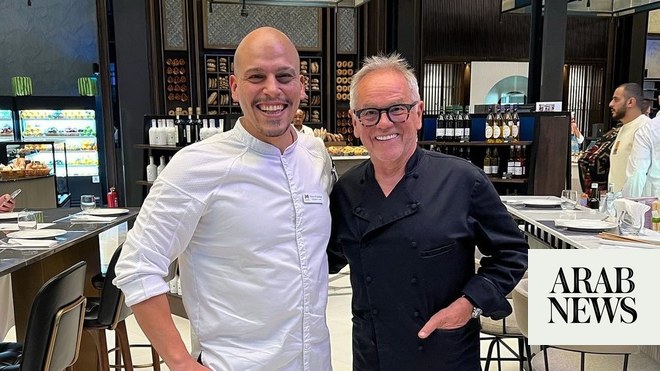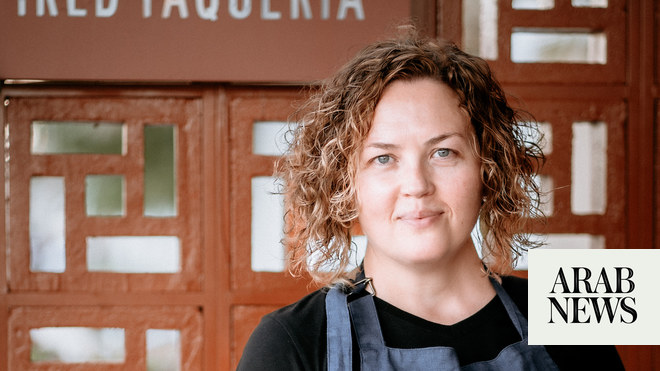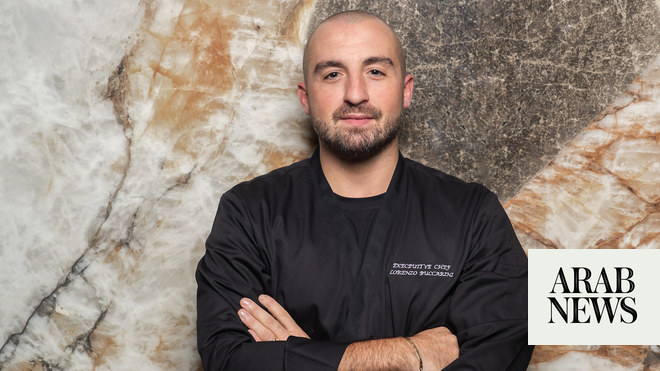
Chef Evangelos Liakouris is running the kitchen at the Riyadh Season pop-up, and explains the thinking behind the dish-sharing concept. “Basically, for us Greeks, food is not just to feed ourselves because we have to eat and get energy; it’s part of the culture — sitting at the table together and discussing the topics of the day, bringing people together, families and friends gathering,” he tells Arab News. “You can awaken emotions by being all together and enhance memories, and the connecting link is the food.” For Hellenika’s local clientele, Liakouris explains, the restaurant has adjusted some traditional Greek dishes with Arabic touches.
“We have a dish called talagani, which is similar to halloumi. A Greek-Cypriot gentleman fell in love with a lady and moved to the Kalamata region of Greece (to be with her). He knew how to make halloumi cheese so he created something similar to it, but with different characteristics — that’s talagani,” he says. “And one of my favorite Middle Eastern desserts is knafeh. So what I did is I took the (Greek pastry) kadaifi and (made it into a warm, savory dish). That idea comes from knafeh, so we’ve taken Greek products and used them in a way people in the local market will understand.” Here, Liakouris discusses the value of mistakes, the best seafood, and the importance of ego.
When you started out as a professional, what was the most-common mistake you made?
(It took some time before I realized) it"s all about food pairing and seasonality — understanding how the ingredients work. Then creating a dish becomes much easier. But sometimes it’s important to let mistakes happen; we forget that a lot of recipes came about by mistake. But in order to understand and use these mistakes in a good way, we must understand the pairing and how the food works not just as ingredients but as chemistry.
What’s one ingredient you think can instantly improve a dish?
I can’t live without extra virgin olive oil. Our olive oil is a blend of two different olives, so it makes it very special. It has an acidity of 0.28. Olive oil has to be below 0.8 to be considered extra virgin. So ours is well below that.
Another ingredient that I love is mastika (a sweet liquer flavored with mastic). It comes from just one island, called Chios. It won’t grow anywhere else. It costs around 3,000 Euros per liter.What’s your favorite dish to make?
My mother is from an island called Icaria, so I love making seafood. People always ask what the best seafood is, and my answer is that the best seafood is fresh seafood. But you have to be very delicate with it. To cook a very nice, juicy fish is very complicated, technically.
What’s your go-to dish if you have to cook something quickly?
It’s a Greek dish, trahana. It’s a small cracked-wheat pasta (fermented in) sour milk or yogurt, and then we use some flour or other ingredients sometimes. When you want to eat something fast, you take some stock or tomato or some yogurt and put this pasta inside. Mix in some herbs and feta cheese and it’s a super-quick, delicious and nutritious dish.
What are you like in the kitchen? Are you laidback, or a disciplinarian?
I’ll never put someone in a corner and make them feel uncomfortable; I will try to elevate their talents. This way you can (be productive). I always say that when you join my team, you are under my umbrella and you should feel safe. When people trust you, they can work in a better way. But of course there are rules everybody has to follow. For example, anybody can be late, but if you don’t inform me, you’re automatically out that day. It’s important everybody respects each other.
There’s an assumption that chef’s have big egos. Is that fair?
To be honest, yes. If you want to be good at something, you have to be competitive, and you can’t be competitive if you don’t have an ego. It’s all about creating a culture and trust between people, so we can share the same vision.












